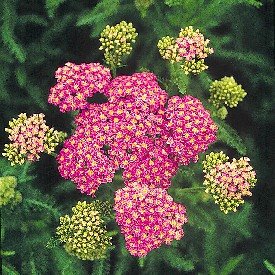
This aromatic, lacy-leaved plant is topped with a flat head of small flowers. It was once used for colds and as a tonic.
In the ancient times, Yarrow was used medicinally to staunch wounds & stop bleeding. It was sacred to the god Ares, & was in particular associated with the godlike warrior Achilles, for whom the genus "Achillea" is still named. It was said to have sprung from the rust Achilles scraped from his spear to heal a centaur fallen in battle, whom Achilles himself had injured.
Its association with warriors continued through the ages, so that it has been known by such names as Soldier's Woundwort, Staunch Weed, Military Herb, Knyten or Knight's Milfoil, Militaris, & was carried by soldiers into battle to insure courage & magical protection from being wounded at all.
I found two old English verses related to this flower...
If my love loves me, 'twill bleed every drop.
In the name of Jesus Christ, I pluck it from the ground.
As Jesus loved sweet Mary & took her for his dear,
So in a dream this night, I hope my true love will appear.
Lastly, A tonic of Yarrow tea if taken within a church was supposedly a great cure for demonic possession.
Ahem...!









No comments:
Post a Comment